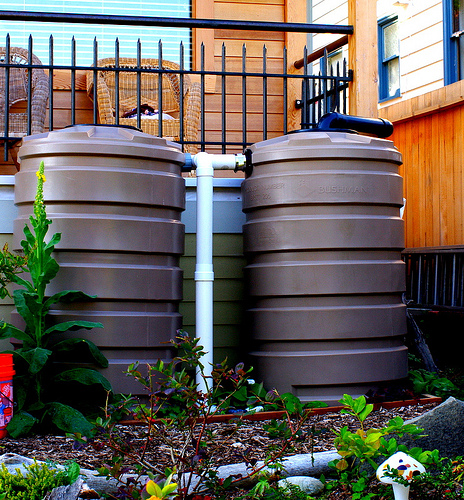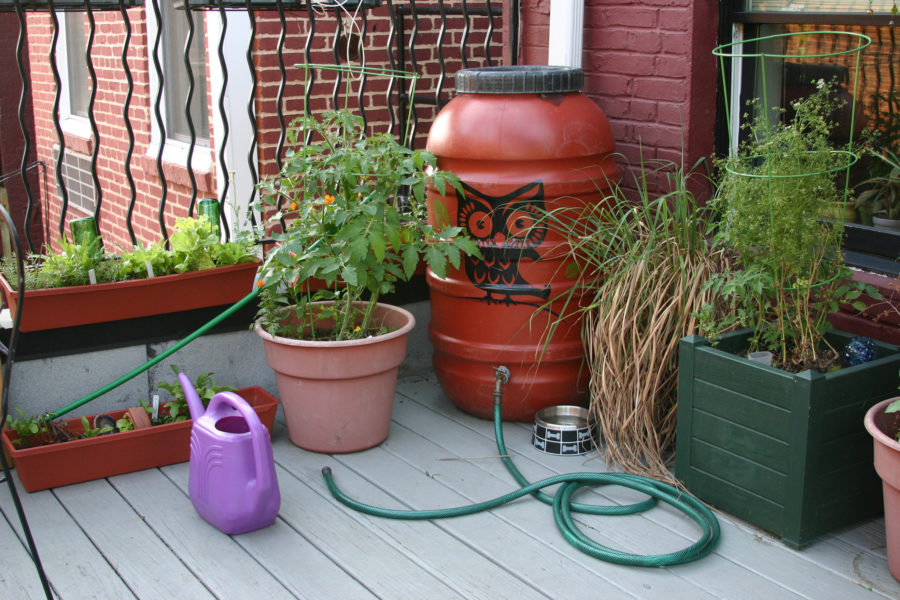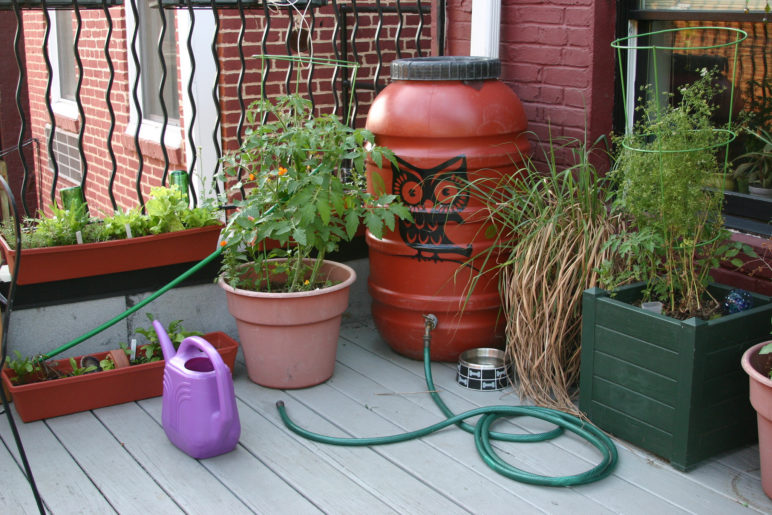Just a few years ago, a Washington state homeowner who simply stuck a rain barrel at the end of a gutter to collect water for watering a garden or washing a car was arguably breaking the law.
Sure, people did it anyway. But if one really wanted to get persnickety, there was an argument to be made that anyone collecting rain needed a water right, since the state at one point in its history laid claim to regulating all waters “above, upon and below” the Earth.
Virtually no one objected to letting city folk save some rain. The practice has clear benefits in urban areas, like holding back water that overwhelms sewer systems during storms. And flushing toilets or watering a garden with collected rain means utilities don’t have to spend as much money treating water to drinking standards.
The legal limbo for rain barrels seems like it should have been an easy problem to fix. But, for something close to two decades, people who thought it would be nice for a law-abiding grandmother to be able to water her peonies with the rain collected from her roof saw their best intentions get chewed up and spit out by state water politics, as bill after bill died.
In the end, this turned into a success story, after a state hydrologist and a creative state attorney found their way through a thicket of competing interests, from agricultural users to gravel miners to builders to environmental groups to tribes. In October 2009—after years of argument—the state of Washington officially declared that people can collect and store rainwater collected from a rooftop or other “guzzler” system without a water right, as long as it is used on site and essentially isn’t hurting anybody else.
The rain barrel saga demonstrates how laws that have been on the books for nearly a century can outlast their usefulness.
The rain barrel saga demonstrates how laws that have been on the books for nearly a century can outlast their usefulness, and how we can go about removing the legal barriers to sustainability. But, still, it begs a few questions: Why in some cases is it so hard to do the right thing? What does it take to get things done when that’s the case? And how can we tweak laws to support and encourage the kinds of things we do want to see?
To answer that, let’s start with Rep. John McCoy, a four-term Washington legislator who just wanted to make it clearly legal for a homeowner to have a rain barrel in a back yard. He tried for six years to pass legislation to that effect (and said one of his predecessors tried for 12 years before him.)
Here’s how he saw the issue:
In residential and metropolitan areas like the city of Seattle that are already at the end of the water chain, there’s no reason in hell why people shouldn’t be collecting water off rooftops because all it’s going to do is go straight into Puget Sound. So why not capture it?
In reality, no one was ever going to get in trouble for having a rain barrel behind a house. But the legal uncertainties were more problematic for green builders who wanted to collect rainwater to wash clothes or flush toilets in a new condo building, or health food store or even a city hall. Washington has a backlog of thousands of people seeking water rights, and if neighbors opposing a new residential building wanted to challenge the project on the water right question, for instance, they could have tied things up for a while.
The city of Seattle did eventually manage to get a blanket permit allowing rainwater collection in most (but not all) parts of the city. But that still didn’t help anyone living elsewhere in the state. And once McCoy opened the question, large water users—from Eastern Washington farmers to industries that needed water to wash gravel or sand—wanted to be able to collect rainwater too. On a scale that made some environmental groups and tribes nervous.
Those groups worried that allowing large rainwater collection systems, particularly in rural areas, could bleed other wells dry or siphon off enough water to hurt fish that need healthy river flows to survive. And they worried that developers could use rainwater collection systems to get around growth restrictions in parched areas without sufficient water. (Particularly when they saw how the state’s exemption for domestic wells was being abused in some places.)
So while nobody in Olympia had any heartburn with making back yard rain barrels legal, there was serious disagreement over the bigger cisterns that might be used to feed industrial systems or water a golf course. So, year after year, groups on one side of the issue or another were unable to come to an agreement on the appropriate size of a legal rainwater collection system and successfully bottled the issue up in the Legislature.

Double rain barrel in Seattle by Lisa Stiffler (Used with permission)
After watching this dynamic for years, Kurt Unger, a state Department of Ecology hydrologist and policy analyst who also happens to be an attorney, turned the question on its head: Instead of banning rainwater collection everywhere because it might pose a problem somewhere, why not just allow people to do it until there’s evidence of a problem?
The rainwater collection issue has only been legally troublesome in a handful of states, including Colorado and Utah. But there are some common sense exemptions to state water law. We don’t require people to get a water right if their house is on fire and they need to suck water from a nearby pond to put it out. And we don’t make backpackers get a water right when they pump and purify drinking water from a stream.
So Unger dug through the old statutes and enlisted the help of an assistant attorney general to come up with a defensible legal theory that allowed the state to forgo enforcement of rainwater collection under those exceptions, while still reserving the right to regulate it in the future if there’s evidence of harm. As Unger said:
We very much did not want jurisdiction over rain barrels and even large cisterns. We’ve got a backlog of 6,000 or 7,000 water right applications, and the last thing we want is more people thrown into that backlog. Plus, we don’t want to regulate people if we don’t have to.
After a rulemaking process blew up in controversy, Ecology decided to work on a policy clarification that the agency could pursue more independently. To get buy-in, though, officials had to persuade the environmental community and tribes that there simply wasn’t enough rain or rooftop in parched areas to accommodate collection systems big enough to damage other users or the environment. (A study from Colorado found that catching rain was unlikely to have an effect on other water users or streams.)
There was still some concern that people who wanted to use rainwater as the sole source of water (for drinking, cooking, washing) could get around growth restrictions in places where well water wasn’t available, but, Unger said, that requires serious commitment on the part of the homeowner and isn’t likely to become a widespread building trend.
We had some conversations about how difficult that really is – people have to be super efficient and the sheer maintenance involved in relying on rainwater is difficult. People who actually want to do it are the most conservation-minded people.
Finally, in October of 2009, Ecology got the parties on board (more or less) and officially clarified that it had no intention of becoming the rain barrel police. And everyone across the state who had been using rain to water lawns, stock bird baths, fill baby pools and wash their decks were no longer scofflaws.
So what can we learn from this years-long effort to make a simple regulatory fix? A few things come to mind: first, people (justifiably) worry that loosening or changing existing laws can lead to unintended consequences. So it’s important to assess how likely those are and figure out how to address them.
Secondly, a handful of individuals who are interested in seeing something happen and approach problems creatively can get things done.
And most importantly, instead of relying on blanket regulations to block things that we don’t want (people overusing scarce water), why not encourage and allow people to do the things we want (reusing rainwater responsibly) while maintaining common-sense protections (let’s regulate if there’s a problem)?
In the coming weeks, stay tuned for other Making Sustainability Legal success stories, and what lessons we can learn from them.
Want more? Sightline gives you a green light for using rain barrel water on your garden veggies.
Sightline’s Making Sustainability Legal project identifies specific regulatory barriers to affordable, green solutions. If you’ve come across such an obstacle, please let us know by writing Eric (at) Sightline (dot) org.











Alby
Finally got around to setting this up, just about the time the radioactive fallout from Fukushima started saturating the Northwest. Great. Just great. Now I can nuke my own plants without having to wait for another leak at Hanford.
Johnny Moore
speaking of fallout, The temp the other morning was 27 degrees and the water that I captured did not freeze. Even the water in my pet containers. I expected at least a sheet of ice in the buckets. I put a thermometer in the water 30 degrees.
Zum Zamim
You folks are crazy.
Jack
Great article, I wondered how Washington was coming in the rainwater harvesting realm. Perhaps your readers would like to attend the American Rainwater Catchment Systems Association (www,arcsa.org) conference in Portland, OR. The exhibit hall is open to the public on Tuesday, September 27th. Check out the Texas blog at: http://bit.ly/dY9Ahc
Dave
Its good to see an article like this – I wish there were more of them. I hope you can keep up the good work. Thank you. Catching rain water from a roof makes sense, in fact it is almost a no-brainer. In the city, it helps to keep the storm drains from being overloaded. This stupid law should have been changed years ago – the water ends up in the ground anyway just a little more slowly.
I do wonder why more people don’t use slow sand filters on their rainwater? They are so easy to set up and they work quite well. They even take out – yes actually take out cryptosporidium and Giardia lamblia cysts (safe levels of clorine or ozone won’t kill them) , e coli coliform; and greatly reduce traces of dissolved petroleum that can be in roof water from air pollution and tar shingles – my website has all the info; there’s lots of it elsewhere on the net also.
Barbara
Would like to visit your website and get that information. Care to share? Thanks
john
barbara,
I don’t know for sure, but a guy named Dave has been doing really neat stuff at this website.
I believe it could be the same gentleman.
Goto the website below-
click “rain water harvesting and slow filter”
http://www.enlight-inc.com
good luck
Matt
Has anyone run the numbers on this. It seems to me like it would not make sense to spend $100 on a barrel so you can collect water when tap water is relatively inexpensive. In my area with water prices being what they are the break even point works out to well over 50 years, and that is without a time value of money adjustment included.
Also, consider the environmental impact of the manufacture and transport of the barrel along with the disposal of the barrel at the end of its useful life. I would like to think that collecting rain in a barrel makes sense, but considering all these factors, it starts to look less desirable, unless you live in a place where water is scarce and expensive.
Bryan Henderson
I agree with that evaluation. I believe the $100 cost of the rain barrel is in fact a measure of how much damage it does to the planet to have a rain barrel, while the 2 cents a cubic foot for the tap water is a measure of how much damage it does to the planet to use the tap. I’m counting people as part of the planet in this analysis, so human labor is worth something.
An environmentalist might, though, think society on the whole is undervaluing the damage that diverting rivers to the kitchen faucet does and therefore still believe the rain barrel makes the world come out ahead.
The Washington water economy is badly broken because it’s so hard to trade water rights, so it’s quite possible that the tap water is in fact greatly underpriced.
john
$100.00 for a “rain barrel” seems extremely high. Maybe crooks in the city charge that. (should be able to buy new storage for $1.00 down to .40ish cents a gal capacity.)
Even still. with the potential of natural disaster, I would rather have some form of water storage should the world come unglued.
mariah
small rain barrels run 10 bucks and big 335 gallon tubs run about 75 bucks. I have a large garden and see my water bill go up 25.00 a month with out rain barrels so in the long run one or two seasons and it’s paid for itself
Noreen Flowers
I am seeking information on where I can obtain a large corrogated galvanized steel cistern for the eco village where I live, Nickelsville here in SW Seattle. Also if any architects would like to donate a little time in perfecting a plan I have for a structure for the rainwater collection. 971-5913 Noreen Thanks !
Concerned
Noreen, aren’t you concerned about the durability of a corrugated steel cistern as Nickelsville periodically moves to new locales? Also, even though primarily a homeless refuge area, you still have to meet all the city planning and zoning as it is not for single building or residential use… You might be better off with something so simple as an above ground pool and build a roof structure over it.
RainBank Rainwater Systems LLC
Rainwater collection no matter what size of the storage has been legal in all counties in Washington since Oct 2009. King county as well as Skagit, Whatcom,Island, San Juan, Jefferson,and others allow rainwater for household use including drinking.I have installed well over 100 systems throughout washington for residential and commercial applications.please see my web site http://www.rainbank.info. Thank you
Bryan Henderson
As a technicality, from what I’ve read, I don’t think collecting rainwater without a permit is legal; the Department Of Ecology doesn’t have the power to excuse someone from the state’s law that you can’t divert surface water without a permit. I think it’s legal in the same sense as marijuana use is legal (the federal government has said it won’t enforce the federal law against marijuana use).
It’s frustrating that Department had to stoop to this because the legislature, in spite of trying, couldn’t pass a bill saying the same thing. I don’t know why the legislature is so paralyzed when it comes to anything to do with water allocations.
Dave
All 50 state governments checked. This page on this blog has links to all sources: http://www.enlight-inc.com/blog/?p=1036
Only Colorado still makes it illegal for some people to set up rain barrels. All other 49 states have no laws against rain barrels. Texas has a law protecting citizen’s right to collect rain water.
The true cost of “tap” water is huge. Your house payment and taxes pay for the infrastructure to bring that water to you, and to take it away. Only considering the cost of the water is not the whole story. The math is done here: http://www.enlight-inc.com/blog/?p=2167
lathechuck
Re: the economics of a rain barrel. To the person who says “but I spend $50/year on water, so I can break even on a $100 barrel in two years”, I have to ask: How many times do you have to fill and empty the barrel to pass $50 of water through it? I pay about $0.01 per gallon, so my 55-gal barrel holds $0.55 of water. So, I’d need to fill and empty it about 90 times in a summer to provide $50 of water. Of course, if we got that much rain, I wouldn’t have to irrigate at all! My experience is that I cycle my rain barrels maybe five – ten times a year ($2.50-$5.00/year). But, since I made my own by recycling soft-drink flavor syrup barrels, the actual cost was about $25. The main attraction is that the water is purer, and it’s there just in case the regular supply is interrupted.
Linda
Another aspect for those mentioning price. My well does not provide water without electricity. So safer to have access to stored rainwater, than have zero water.
Randy
If states say they own all the water that falls then they are responsible for any home that gets flooded and can’t hide behind “an act of god” for the flooding. The state should pick up the tab for any flooded homes.
Wanda Hightower
I’m glad we do t have to pay to collect rain water. A lot of friends didn’t know it was at one time to iligally collect water in barrels